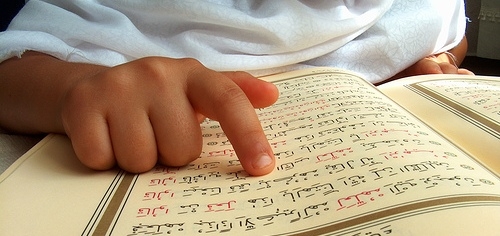Ahl al-Bayt (A.S.) and the Holy Quran

Beyond doubt, understanding the Holy Quran does not depend solely on knowing the meaning of the Arabic words or on being familiar with the Arabic literature. Were it so, Allah would not have introduced in His Book the people of the Reminder, who are Ahl al-Bayt according to the narrations related by both Shiite and Sunni Muslims, as the teachers of the Holy Quran.
Considering that Allah has introduced teacher for the Holy Quran, understanding the main parts of this Book which according to Imam Ali contain “Its permission and prohibitions, its obligations and discretion, its repealing injunctions and the repealed ones, its permissible matters and compulsory ones, its permissible and the general ones, its clear and obscure ones” is not a layman’s job.218
People from all walks of life, whether academicians or theologians, intellectuals or non-intellectuals, scholars or laymen, mystics or philosophers need to refer to valid narrations and reports by Allah’s Messenger and Ahl al-Bayt so as to enter the profound sea of the Holy Quran. They have to board the ship of their knowledge in order to find the truth.
Should they choose a path other than this, they will have to impose their own findings on the Quranic verses as the meaning of this Divine Book; hence they will inflict irreparable damage on themselves and on Muslims by doing so.
Commenting on the Holy Quran, Allah’s Messenger has said: It has a well-arranged and well-decorated appearance and it has a profound inward aspect. Its marvels cannot be counted and its wonders will never get old.219
How can we possibly understand the Holy Quran when Allah’s Messenger describes it as such? Only those should speak of the interpretation of the Holy Quran who are firmly rooted in knowledge as described by the Divine Book itself. According to valid and genuine narrations, those firmly rooted in knowledge are no one but the Holy Prophet and his purified Ahl al-Bayt. Should the implicit verses of the Holy Quran be interpreted and the interpretation accepted without seeking help from Ahl al-Bayt, it would certainly lead man to atheism and perdition. These verses must be interpreted by those firmly rooted in knowledge and literal meaning must be avoided.
As for the interpretation of abrogating and abrogated, dependent and independents as well as general and particular verses, it should be done by Ahl al-Bayt. Any personal interpretation of the Quranic verses will make man afflicted with an irreparable loss. As an example, we read the following in the Holy Quran, The hand of Allah is above their hands. (48:10)
Hand does not mean a physical hand rather it means ‘Power’. Should we take hand as the real hand, we have thought of Allah as having a body, which is an evident blasphemy. Therefore, the interpretation of the above-mentioned verse is: the power of Allah is above all powers.
Another example is 17:72 of the Quran: And whoever is blind in this world, he shall also be blind in the hereafter; and more erring from the way.(17:72)
If we take the literal meaning of ‘blind’, we have to believe that those believers who stood at a high rank in terms of faith and good deeds and were favored by the Prophets and the Imams are deprived of seeing the scenes in Paradise - a belief that does not conform with 43:71 of the Quran: Therein shall be what their souls yearn after and wherein eyes shall delight (43:71)
Therefore, we should give in to the Ahl al-Bayt’s interpretation of the word, which is ‘blind-hearted’ not ‘physically blind’.
Thus, we realize that the implicit verses need an interpretation not based on the appearance and the literal meaning of the word but it must be interpreted in another way. This is exactly what Allah has entrusted to those firmly rooted in knowledge: None knows its interpretation except Allah and those who are firmly rooted in knowledge. (3:7)
Those who are firmly rooted in knowledge are those who enjoy a firm and true knowledge in which there is no change. It is knowledge that Allah has caused to shine in the hearts of His servants; namely, the Prophets and the Imams. In this relation, Imam al-Sadiq (a.s.) has said: We are firmly rooted in knowledge and we know how to interpret the Holy Quran.220
Truly the only knowledge, which is not subject to change and is different from the knowledge of all scientists and scholars, is the knowledge of the Prophets and the Imams, which is fixed until the Resurrection Day. This is so because their knowledge is Divine and based on intuition; that is to see the truth with the eyes of the heart. Beyond doubt such hearts never make an error in realizing the truths and in finding the manifest and hidden secrets of the universe.
Notes:
218. Nahj al-Balaghah: 52, First Sermon
219. Al-Kafi: 298/2, H. 2
220. Al-Kafi: 213/1, H. 1
